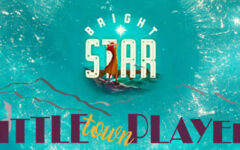Our UK correspondent, Richard F. Thompson, put together this report on an important event we missed last fall.
 In November the legendary folk/bluegrass singer, songwriter and activist Hazel Dickens was honored as one of the inaugural inductees into the West Virginia Music Hall of Fame at a ceremony at The Cultural Center in Charleston, West Virginia.
In November the legendary folk/bluegrass singer, songwriter and activist Hazel Dickens was honored as one of the inaugural inductees into the West Virginia Music Hall of Fame at a ceremony at The Cultural Center in Charleston, West Virginia.
Belatedly, I submit this tribute and report of the evening’s activities ‚Ķ‚Ķ‚Ķ.
Considered one of the most influential and powerful artists, male or female, in the world of Americana music, Ms. Dickens was presented with her award by her longtime admirer, Alison Krauss.
Born in the coal-mining region of West Virginia (Mercer County), Ms. Dickens moved to the Baltimore area while in her late teens. There she found friendship and musical compatibility with local area musicians like Mike Seeger and Alice Gerrard. Dickens, Gerrard and Seeger along with Tracy Schwarz and Lamar Grier recorded an album released an LP under the name of the Strange Creek Singers. Later, Hazel and Alice worked together as a duo. They recorded four ground-breaking albums before they went their separate ways in 1976.
Subsequently, Ms. Dickens has released several solo albums that have presented what has been described as “her uniquely personal amalgam of old-time string band sounds, bluegrass, protest songs, and classic country.”
Her music is renowned for the way in which she has spoken up for the impoverished, like the coalminers of her own and nearby states. Songs such as Working Girl Blues, Black Lung, and Don’t Put Her Down, You Helped Put Her There speak typically of her feelings for the cause of those who have suffered or are suffering hardship in their lives, like many of the Dickens’ family members themselves.
Her music was featured in the Oscar-winning documentary Harlan County, U.S.A., which depicted the tensions surrounding a coal miners’ strike in rural Kentucky. Her poignant songs, such as Mama’s Hand, Few Old Memories, West Virginia, My Home and You’ll Get No More Of Me, have been widely recorded by other artists.
In 1993 Ms. Dickens was presented with the International Bluegrass Music Association [IBMA] Award of Merit. Three years later she won the IBMA Song Of The Year award after Lynn Morris recorded a superb version of Mama’s Hand.
In 2001 Hazel Dickens was awarded a Heritage Fellowship by the National Endowment for the Arts, the highest official honor bestowed on traditional musicians by the U.S. Government.
Tim O’Brien, one of the musicians who entertained guests during the evening, provides a little general information about the evening and pays his own tribute to Hazel Dickens ‚Ķ‚Ķ.
It was a heart warming event in Charleston last Friday. As a member of the board of the West Virginia Music Hall of Fame, I felt our hard work of the last two years paid off big time when the inductees and their friends and family gathered together to celebrate the music if my home state. Many of the best and brightest leave the state and make a name for themselves where there’s more opportunity, but without exception the inductees underlined the fact that they could never do what they do without the influence and environment of West Virginia. The tribute CD to Blind Alfred Reed, Always Lift Him Up, was launched Friday as well. On that project, various musicians with West Virginia roots contributed a track each in the name of the West Virginia Music Hall of Fame. It serves as a reminder of the diversity of talent from West Virginia, and helps those in and out of the state to re-connect in a kind of musical reunion. Most of the musicians involved learned more about Alfred Reed and the CD will promote Reed’s music and the music of the state.
Hazel Dickens is someone that I have often looked to as a prime example of a true artist. She left the state but kept it’s feeling inside her as she went about developing her music. She remains true to her roots while simultaneously creating her own musical and lyrical voice in the process. She speaks for the downtrodden, the underdog, and we’re better for it. I love singing her song, “Won’t You Come And Sing For Me.” Hazel is an invaluable link between the old mountain culture and the more mundane modern world. She makes the best of both elements in order to give something invaluable back to us. What more can you ask for. I keep going back to those early Hazel and Alice records to hear the real thing, and I get more and more into Hazel’s original songs as the years go by.
Alison Krauss doesn’t do many things like she did last Friday. She’s very private and not given to public appearances outside her solo career. Her presentation of Hazel’s award was incredibly heartfelt. She outlined her experiences of Hazel and her music, how the person and the songs inspired and continue to inspire her. Then when Hazel came up to accept her award, she had prepared a beautiful speech on what the state meant to her and how she would never forget what formed her music and her life’s direction.
Little Jimmy Dickens had told me a few months ago that he had heard so much about Hazel, and was really excited to meet her. When Hazel heard about this, she said that of course they’d met years ago, she had a picture to prove it, and that in fact they were related. It made me feel like the Hall of Fame project was worthwhile, seeing Jimmy and Hazel talking together. The same with Bill Withers and Jimmy – Withers related how he listened to Little Jimmy on the radio growing up in Slab Fork.
Charleston-based musician/singer and the editor of Goldenseal, the official West Virginia cultural magazine, John Lilly provides this assessment of Hazel and her music ……
Hazel Dickens’ music comes at you like molten steel: deeply passionate, at times painful, and forever riveting. Like any great artist, Hazel delves into her most private emotions and personal experiences to reveal the universal. This is especially true here in West Virginia, where making a living, maintaining a home and family, and standing up for what you believe often come with a difficult price. It was essential that Hazel be among the first people inducted into the new West Virginia Music Hall of Fame. She speaks for all of us.
Hazel was, as usual, most gracious in her response to the receipt of this latest honor …….
I shall regard and hold this honor in the high esteem which I have always held and protected and carried forth the music and culture into which I was born. These rugged mountains and cold dusty mining towns and lonesome hollers have shaped my life and music for all time. Thank you West Virginia for your rich heritage you gave me in the past and thank you for what you have given me today. I have received many honors and awards in my time but this one will hold the number one place in my heart. It gives me great comfort and pride in knowing that after all these years me and my music now have a home.
In all ten renowned West Virginia musicians were inducted into the Hall Of Fame. In addition to Hazel Dickins, there were classical composer George Crumb; stalwart of the Grand Ole Opry, country singer, Little Jimmy Dickens; songwriter Billy Edd Wheeler; hit singer/songwriter Bill Withers; Jazz saxophonist Leon “Chu” Berry; rock’n’roll pianist Johnnie Johnson; fiddler Clark Kessinger; early country singer Mollie O’Day and old-time singer and songwriter Blind Alfred Reed.







